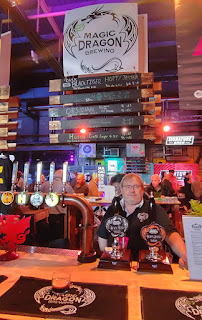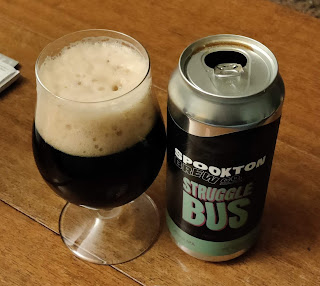As well as enjoying the beers, of course, it was a great opportunity to talk with the brewers and brewery staff, both about the beer and about what’s going on in their parts of the industry.
Magic Dragon was a new one on me – turns out it used to be Plassey, and it's Wrexham-based so I guess that explains the dragon! As I was enjoying a sample of his Black Tiger black IPA, head brewer Richard Lever mentioned that his beers had won SIBA and other awards, so we had a chat about what attracts microbrewers to competitions.
"I enter the ones I like," he said. "I also want to find out how they do - if you don't put a beer in to be judged, you don't get feedback." He also mentioned that his beers are mostly cask but that this is changing: "We're quite new in keg, but we are starting to do more – North Wales is opening up to keg."
How long, I wonder, before they're in the same position as London and other cities, of trying once again to rescue falling cask sales?
Some aficionados disregard
Drygate as 'crafty macro' because it's part-owned by Tennents and does several supermarket-friendly brews, such as Disco Forklift Truck. It doesn’t help here that the latter recently had an ABV drop "to make it more approachable", which is typical macro behaviour.
Yet at the same time the other owner is a bona-fide micro, Williams Brothers, and Drygate's beers are good regardless. As well as the regular brews, head brewer David introduced me to the latest in their one-off series, a rich and heavy 9% stout called Big Purple One.
Full of caramel, coconut and hazelnut notes, it’s his interpretation of a certain purple-wrapped hazelnut and caramel sweet found in a popular boxed chocolate assortment, and yes, it’s delicious. Somehow it manages to get the flavour right, yet actually be less sticky than the original, with a warmth that takes the edge off the sweetness. I’ll take a bottle of this over a handful of Q****** S***** any day!
Almost exactly six years ago, the legendary David Bruce toured myself and some fellow visitors around the shiny new brewhouse at West Berkshire Brewery, along with its then very newly installed million-pound bottling and canning line.
It was an impressive and ambitious setup, so I was saddened to hear a year or two back that WBBrew had hit financial trouble. I don’t know whether it was due to over-extension, a somewhat me-too product range, the pandemic, or more likely a combination of all of those.
Either way, it was very good to see that the brewery has survived. It was eventually bought out by the Yattendon Estate, which owns the surrounding lands, and has now been rebranded as
Renegade, which was the name West Berks had used for its craft line.
I tried a couple of the Renegade brews that I didn’t recognise. Blackguard is a very nice creamy-burnt stout, while festival special The Void was something I’ve not seen before – a Cold IPA that’s also a Black IPA, a combination that I found worked remarkably well.
There’s a lot of confusion written and spoken about Cold IPA, but essentially it’s an IPA brewed to be crisper and cleaner. That typically means brewing it cooler, and sometimes with lager yeast, but it still has the malt bill and hopping of an IPA, which is what differentiates it from the hoppy lagers that some people call IPL (India Pale Lager).
Some claim it’s about showcasing the hops, and yes, the hop character does usually come through well, but what The Void showed me was that it can also make the malt character – in this case, a roasty-dryness with a burnt tang – come through a little more clearly. The result was unusual, with some unexpected but very pleasing characteristics.
You can read part one here and more from Brew//LDN 2023 here Hungarian Voodoo is a sweet surprise and here Start-up brewer shows Spooky quality.





